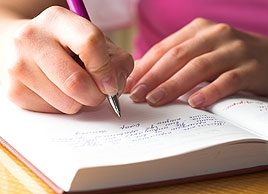Why keeping a food journal will help you lose weight
The secret to shedding pounds, and keeping them off, may be as simple as writing down what you eat and drink in a food journal

Source: Best Health Magazine, January/February 2009
A recent study of 1,700 overweight men and women who participated in a six-month weight-loss program found that those who kept daily food records lost twice as much weight as those who kept no records. Participants also exercised, reduced caloric intake and ate low-fat dairy products plus an average of three servings of fruits and vegetables daily.
‘Keeping a food diary is one of the most powerful weight-management tools we have,’ says Jack Hollis of the Portland, Oregon-based Kaiser Permanente Center for Health Research and lead author of the study, which was published in the American Journal of Preventive Medicine.
Participants were subsequently followed for an additional 30 months, in one of the largest and longest-running weight-loss maintenance trials ever conducted.
Why do food journals work?
‘Many of us want food to ‘not count”because we’re on vacation, we’re in a rush, we’re just finishing off the broken cookies in the bag,’ says Colleen Cannon, a clinical psychologist in Calgary who specializes in helping people deal with the emotional side of eating. ‘The act of writing down what we eat helps to raise awareness about what we’re doing.’
It can also be a tool to get an understanding of portion size. ‘Writing down what and how much you eat and adding up the calories helps you to eat more mindfully and stay on track,’ says Hollis. ‘When starting out, people tend to underestimate, so it’s best to measure the portion sizes carefully at first.’ He adds that for many people, keeping a food journal is a lifelong tool, while others use it if they notice their weight creeps back up.
Make food journals work for you
Obsessing about how many almonds you ate is not the point, says Cannon. ‘Food is supposed to be fun, to be natural, to be practical. If you’re the type to get overly concerned about what you’re eating, use caution if you try this approach.’
And, to keep yourself accurate, write down what and how much you eat right away, rather than at the end of the day. Choose a method that fits into your life: Scribble it down on an index card, track it online, text or email yourself, or use an elegant notebook. The point is to keep it in a handy place. (Download our food journal template for a carry-with-you version you can fit in a binder.)
To make your food journal more effective, include details such as your emotions, location and whom you were with. ‘I think that noting thoughts and feelings is more important than noting the food,’ says Cannon. ‘It helps you see a pattern.’
Maybe you overeat at your weekly’and somewhat stressful’Sunday brunch with your mom, or munch on chips during a solo car trip. Becoming aware of negative thoughts or emotions that affect your eating can be uncomfortable, so if this is distressing you, make sure you talk to a loved one, family physician or counsellor, advises Cannon.
This article was originally titled "Write it off," in the January/February 2009 issue of Best Health. Subscribe today and never miss an issue!




